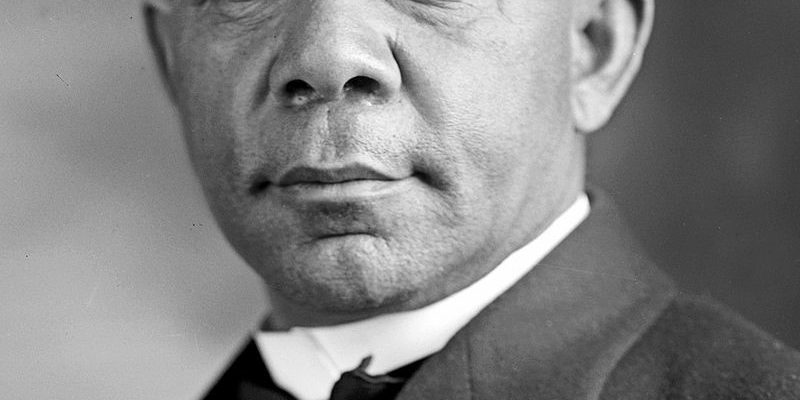Booker Taliaferro Washington was born into slavery on April 5, 1856 in southwest Virginia. Initially, like most slaves, he was known by his nickname “Booker” with no middle or surname. But what began as a tragic result of the sin of slavery that stained the Declaration’s promise of God-given liberty for all was overcome by one of the most amazing stories of courage, character and faith one will read in American history. In my estimation, Booker T. Washington is as big a hero as any founder because he overcame one of their sins and through Christ demonstrated forgiveness and respect.
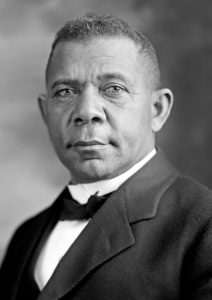 In his autobiography Up from Slavery, one of my favorite classics I teach to high school students, he writes of his childhood “I cannot recall a single instance during my childhood or early boyhood when our entire family sat down to the table together, and God’s blessing was asked, and the family ate a meal in a civilized manner. On the plantation in Virginia, and even later, meals were gotten to the children very much as dumb animals get theirs. It was a piece of bread here and a scrap of meat there. It was a cup of milk one time and some potatoes at another.” From his difficult childhood consider this; by 25 years of age he became the first leader of the Tuskegee Normal and Industrial Institute, met with Presidents William McKinley, Teddy Roosevelt and Howard Taft, was awarded honorary degrees from Harvard and Dartmouth, and was the first African American to have his image on a postage stamp and coin. Probably more important was the honor given him by his own people on his monument at Tuskegee University: “He lifted the veil of ignorance from his people and pointed the way to progress through education and industry.”
In his autobiography Up from Slavery, one of my favorite classics I teach to high school students, he writes of his childhood “I cannot recall a single instance during my childhood or early boyhood when our entire family sat down to the table together, and God’s blessing was asked, and the family ate a meal in a civilized manner. On the plantation in Virginia, and even later, meals were gotten to the children very much as dumb animals get theirs. It was a piece of bread here and a scrap of meat there. It was a cup of milk one time and some potatoes at another.” From his difficult childhood consider this; by 25 years of age he became the first leader of the Tuskegee Normal and Industrial Institute, met with Presidents William McKinley, Teddy Roosevelt and Howard Taft, was awarded honorary degrees from Harvard and Dartmouth, and was the first African American to have his image on a postage stamp and coin. Probably more important was the honor given him by his own people on his monument at Tuskegee University: “He lifted the veil of ignorance from his people and pointed the way to progress through education and industry.”
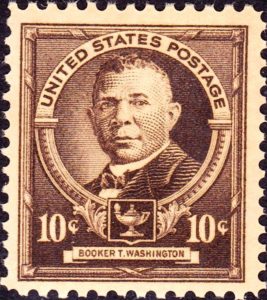 With little to no training and no education to speak of, Booker’s character was formed through hardship. “I have learned that success is to be measured not as much by the position that one has reached in life as by the obstacles which he has had to overcome while trying to succeed.” His love for freedom set ablaze his love of learning. “During the campaign when Lincoln was first a candidate for the Presidency, the slaves on our far-off plantation, miles from any railroad or large city or daily newspaper, knew what the issues involved were… that the freedom of the slaves would be the one great result of the war if the Northern Armies conquered.” Deep inside his heart, Booker knew that freedom meant an ability to read. “From the time that I can remember having any thoughts about anything, I recall that I had an intense longing to learn to read. I determined, when quite a small child, that, if I accomplished nothing else in life, I would in some way get enough education to enable me to read
With little to no training and no education to speak of, Booker’s character was formed through hardship. “I have learned that success is to be measured not as much by the position that one has reached in life as by the obstacles which he has had to overcome while trying to succeed.” His love for freedom set ablaze his love of learning. “During the campaign when Lincoln was first a candidate for the Presidency, the slaves on our far-off plantation, miles from any railroad or large city or daily newspaper, knew what the issues involved were… that the freedom of the slaves would be the one great result of the war if the Northern Armies conquered.” Deep inside his heart, Booker knew that freedom meant an ability to read. “From the time that I can remember having any thoughts about anything, I recall that I had an intense longing to learn to read. I determined, when quite a small child, that, if I accomplished nothing else in life, I would in some way get enough education to enable me to read ![]() common books and newspapers.” His mother eventually got him a Webster’s blue-backed speller. “I began to devour this book, and I think that it was the first one I ever had in my hands.” Throughout his life, Booker T. Washington emphasized the personal responsibility to educate oneself so that coming into contact with teachers simply exponentially increased learning.
common books and newspapers.” His mother eventually got him a Webster’s blue-backed speller. “I began to devour this book, and I think that it was the first one I ever had in my hands.” Throughout his life, Booker T. Washington emphasized the personal responsibility to educate oneself so that coming into contact with teachers simply exponentially increased learning.
 Booker T. Washington, however, was a Christian, and it was his faith that inspired the formation of his character as well as his courage to lead his people out of slavery and into the responsibility of liberty. “No man can read the Bible and be lazy. Christianity increases a man’s… capacity for labor.” It was the Bible that taught him truth. “If you want to lift yourself up, lift up someone else.” He once said “you never read in history of any great man whose influence has been lasting, who has not been a reader of the Bible.”
Booker T. Washington, however, was a Christian, and it was his faith that inspired the formation of his character as well as his courage to lead his people out of slavery and into the responsibility of liberty. “No man can read the Bible and be lazy. Christianity increases a man’s… capacity for labor.” It was the Bible that taught him truth. “If you want to lift yourself up, lift up someone else.” He once said “you never read in history of any great man whose influence has been lasting, who has not been a reader of the Bible.”
His work at Tuskegee Institute was profound. The independent work ethic of the students, and the skills they learned so that they could be successful, got much attention. Yet the true secret was revealed by Booker when he said “While a great deal of stress is laid upon the industrial side of the work at Tuskegee, we do not neglect or overlook in any degree the religious and spiritual side. The school is strictly undenominational, but it is thoroughly Christian, and the spiritual training of the students is not neglected. Our preaching service, prayer-meetings, Sunday-school, Christian Endeavor Society, Young Men’s Christian Association, and various missionary organizations, testify to this.”
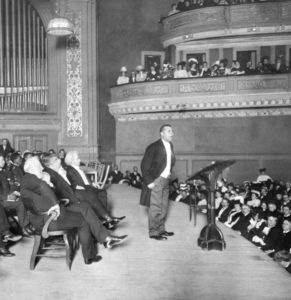 Booker T. Washington also had courage. He faced a world where his own race was assumed to be inferior. They were told they could not succeed as free. They were even told that they would be better off as slaves than bearing the responsibilities of maintaining liberty. Yet, in the midst of all this he said “I will permit no man to narrow and degrade my soul by making me hate him. With God’s help, I believe that I have completely rid myself of any ill feeling toward the Southern white man for any wrong that he may have inflicted upon my race… I pity from the bottom of my heart any individual who is so unfortunate as to get into the habit of holding race prejudice.” For a man whose life was ruined by the sins of another race to hold no bitterness is a miracle and an example to all.
Booker T. Washington also had courage. He faced a world where his own race was assumed to be inferior. They were told they could not succeed as free. They were even told that they would be better off as slaves than bearing the responsibilities of maintaining liberty. Yet, in the midst of all this he said “I will permit no man to narrow and degrade my soul by making me hate him. With God’s help, I believe that I have completely rid myself of any ill feeling toward the Southern white man for any wrong that he may have inflicted upon my race… I pity from the bottom of my heart any individual who is so unfortunate as to get into the habit of holding race prejudice.” For a man whose life was ruined by the sins of another race to hold no bitterness is a miracle and an example to all.
It is a shameful disgrace to Christianity that “in the name of Christ” such a practice continued as long as it did. It could have ended with the Puritans, but they did not punish the white slave owner according to the Biblical law they espoused. It could and should have ended with the pastors and patriots (founders) who agreed with the words “all men are created equal” written in the Declaration of Independence. However, many of them owned slaves and the greed of economic profit got in the way. Booker T. Washington, interestingly enough, had this amazing comment about how slavery hurt the white man; “The Negro youth must work harder and must perform his tasks even better than a white youth in order to secure recognition. But out of the hard and unusual struggle through which he is compelled to pass, he gets a strength, a confidence, that one misses whose pathway is comparatively smooth by reason of birth and race.” Wow – what a perspective! How we need this to overcome our entitlement attitude!
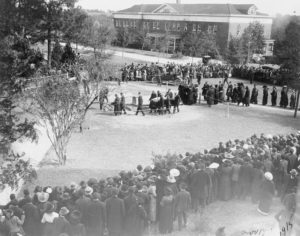 Booker’s emphasis on character, faith and courage to become what one was meant to be by God and allowing his people to gradually earn respect and diminish the prejudices against them was not agreed to by some of his own race. Surely his views and those who opposed him, desiring immediate emancipation through confrontation, also had their merits and a “both-and” approach was best. I would highly recommend his autobiography to any parent, teacher or young person for its Biblical wisdom and practical illustrations of how to handle bitterness through faith and forgiveness. I would also recommend it for its practical lessons on character, work ethic and courage to face mountains and obstacles in our way. At his funeral in 1915, hundreds of teachers, trustees, graduates, students and visitors silently paid tribute to this great man. Distinguished white leaders from business and politics also stood in honor of the one who, through faith, character and courage, lifted his race by blessing the race that held him captive! These lessons from this African-American hero we must teach to our children and grandchildren!
Booker’s emphasis on character, faith and courage to become what one was meant to be by God and allowing his people to gradually earn respect and diminish the prejudices against them was not agreed to by some of his own race. Surely his views and those who opposed him, desiring immediate emancipation through confrontation, also had their merits and a “both-and” approach was best. I would highly recommend his autobiography to any parent, teacher or young person for its Biblical wisdom and practical illustrations of how to handle bitterness through faith and forgiveness. I would also recommend it for its practical lessons on character, work ethic and courage to face mountains and obstacles in our way. At his funeral in 1915, hundreds of teachers, trustees, graduates, students and visitors silently paid tribute to this great man. Distinguished white leaders from business and politics also stood in honor of the one who, through faith, character and courage, lifted his race by blessing the race that held him captive! These lessons from this African-American hero we must teach to our children and grandchildren!

